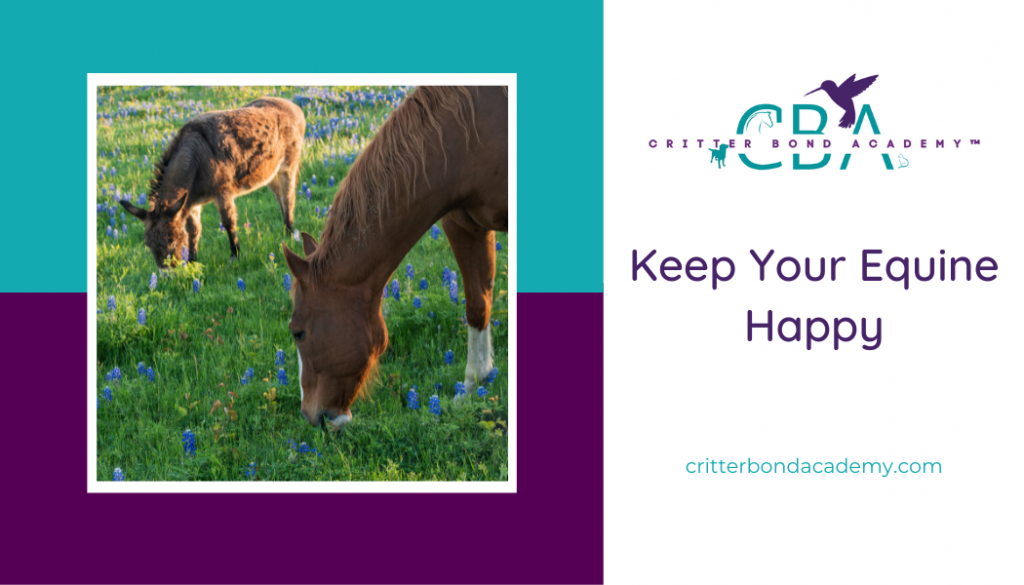Introduction to Equine Welfare
Horses can live twenty-five years or more and require consistent, and specific, care to thrive.
Horses, as we know them now, have been bred specifically to suit the needs of humans; therefore, they can develop serious mental and physical health issues due to breed adaptation and inattention to welfare needs.

Too often, people buy or adopt an equine without understanding the emotional, physical, and financial commitment required to care for them; as a result, the horse is re-homed, sold, traded, or auctioned for meat.
Other times, they’re left in the stable or pasture, without the mental and physical stimulation they require to remain healthy.
Many people regard horses as status symbols instead of sentient beings and care primarily for what the equine can achieve in terms of monetary gain.
This attitude is not only found in the racing industry, but in barns that raise Reiners, Hunters, Pleasure Horses, and even stables which promote trail rides. Unfortunately, this often determines whether their welfare needs are met or even considered.
To further complicate things, there’s a growing trend to find quick fixes and so-called “cures,” that put equines at further risk of being misunderstood and assessed improperly.
Though the internet is helpful in most cases, there’s a great deal of misinformation about equine care that misleads well-meaning guardians.
Therefore, it’s important for caregivers to become more aware to ensure the quality of their horse’s life is not adversely affected by poor training, coaching, and medical care.
The Industry
The equine business is a multi-billion dollar industry. and there are organizations and businesses that prey on the compassion people have for their animals.
It’s not just large pharmaceutical and veterinary providers who make claims to have all the answers. People are promoting natural medicines without proper training or evidence to prove practical and safe results. In addition, the ability to post videos and create impressive websites inspires the unqualified and uncommitted to suddenly become world-renowned experts.
Equines Are Sensitive
Even a change in their schedule can alter their mood and responsiveness. Therefore, most problems experienced during loading and transport are caused by past human behaviours that conditioned the equine to react in ways meant to protect themselves.
There may not be a genuine threat, but the horse truly believes there is, based on similarities to another situation. If we keep this in mind and focus on assessing each situation from their perspective, all aspects of training and management become easier.
The Five Basic Welfare Needs
When we think of suffering, we imagine animal cruelty, but even animals who are typically well cared for still suffer if they’re not provided with these basic welfare necessities. When a horse is deprived of these things, changes in their mental, emotional, and physical health are unavoidable.
Keep in mind these welfare needs are globally recognised as essential for all animals. To better appreciate how an equine behaves, one must first examine whether these needs have been met; and by doing so, their behavioural issues will be identified and managed properly.
Nutrition
Your animal can consume the appropriate nutrition as a healthy and pleasant experience. This means clean, dry, and nutritious food is provided regularly, on time, and in an area that is safe, free from urine and faeces, and can sustain their overall health.
Physical
Your animal is uninjured, free from disease, physically sound, and able to enjoy good health through necessary upkeep and non-invasive care. Regular hoof care is one of the easiest ways to ensure your equine remains healthy, yet many horses suffer and are even euthanized because they’ve been neglected.
Behavioural
Your animal’s environment is designed to best suit their needs, and all interactions between animals are safe, engaging, and satisfying. Your animal can behave naturally, without fear, and is not being forced to behave in any manner that may cause physical, mental or emotional harm.
Mental State
Your animal can experience comfort, and explore interests in their environment while maintaining the confidence to enjoy life without threat to their well-being. Loud music, people shouting, dogs being invasive, or even construction are all examples of events that can affect your equine’s mental health. Other examples include whipping, over-training, using spurs and invasive bits, and being subjected to verbal and physical abuse.
Environmental
Your animal must be sheltered in proper conditions that offer a variety of choices that adapt to their specific needs. For example, a mare about to foal requires a specific environment to ensure her comfort and safety.
Summary
Take a moment to assess how knowing the basic welfare needs of your equine can positively influence your equine’s health and performance. Further, think about how this can benefit you and your relationship with your equine.
